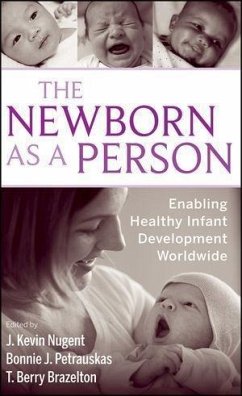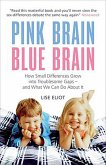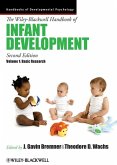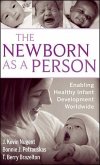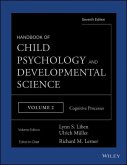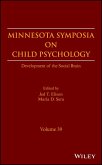The Newborn as a Person (eBook, ePUB)
Enabling Healthy Infant Development Worldwide


Alle Infos zum eBook verschenken

The Newborn as a Person (eBook, ePUB)
Enabling Healthy Infant Development Worldwide
- Format: ePub
- Merkliste
- Auf die Merkliste
- Bewerten Bewerten
- Teilen
- Produkt teilen
- Produkterinnerung
- Produkterinnerung

Hier können Sie sich einloggen

Bitte loggen Sie sich zunächst in Ihr Kundenkonto ein oder registrieren Sie sich bei bücher.de, um das eBook-Abo tolino select nutzen zu können.
Advances in the fields of psychology and psychiatry have bolstered the perspective that infants are not the passive recipients of sensory stimulation as it was once thought. Built on T. Berry Brazelton s paradigm-shifting work on the individuality of infants, this book provides relevant information on the necessity for family-centered intervention in the newborn period. Coverage is wide-ranging, authoritative, and practical. This landmark collection includes contributions from T. Berry Brazelton, Tiffany Field, Rachel Keen, and many others. Pediatric professionals will receive practical…mehr
- Geräte: eReader
- mit Kopierschutz
- eBook Hilfe
- Größe: 0.99MB
![Pink Brain, Blue Brain (eBook, ePUB) Pink Brain, Blue Brain (eBook, ePUB)]() Lise EliotPink Brain, Blue Brain (eBook, ePUB)7,90 €
Lise EliotPink Brain, Blue Brain (eBook, ePUB)7,90 €![The Wiley-Blackwell Handbook of Infant Development, Volume 1 (eBook, ePUB) The Wiley-Blackwell Handbook of Infant Development, Volume 1 (eBook, ePUB)]() The Wiley-Blackwell Handbook of Infant Development, Volume 1 (eBook, ePUB)150,99 €
The Wiley-Blackwell Handbook of Infant Development, Volume 1 (eBook, ePUB)150,99 €![The Wiley Handbook of Group Processes in Children and Adolescents (eBook, ePUB) The Wiley Handbook of Group Processes in Children and Adolescents (eBook, ePUB)]() The Wiley Handbook of Group Processes in Children and Adolescents (eBook, ePUB)139,99 €
The Wiley Handbook of Group Processes in Children and Adolescents (eBook, ePUB)139,99 €![The Newborn as a Person (eBook, PDF) The Newborn as a Person (eBook, PDF)]() J. Kevin NugentThe Newborn as a Person (eBook, PDF)92,99 €
J. Kevin NugentThe Newborn as a Person (eBook, PDF)92,99 €![The Handbook of Solitude (eBook, ePUB) The Handbook of Solitude (eBook, ePUB)]() The Handbook of Solitude (eBook, ePUB)177,99 €
The Handbook of Solitude (eBook, ePUB)177,99 €![Handbook of Child Psychology and Developmental Science, Volume 2, Cognitive Processes (eBook, ePUB) Handbook of Child Psychology and Developmental Science, Volume 2, Cognitive Processes (eBook, ePUB)]() Handbook of Child Psychology and Developmental Science, Volume 2, Cognitive Processes (eBook, ePUB)202,99 €
Handbook of Child Psychology and Developmental Science, Volume 2, Cognitive Processes (eBook, ePUB)202,99 €![Development of the Social Brain, Volume 39 (eBook, ePUB) Development of the Social Brain, Volume 39 (eBook, ePUB)]() Development of the Social Brain, Volume 39 (eBook, ePUB)127,99 €
Development of the Social Brain, Volume 39 (eBook, ePUB)127,99 €-
-
-
Dieser Download kann aus rechtlichen Gründen nur mit Rechnungsadresse in A, B, BG, CY, CZ, D, DK, EW, E, FIN, F, GR, HR, H, IRL, I, LT, L, LR, M, NL, PL, P, R, S, SLO, SK ausgeliefert werden.
- Produktdetails
- Verlag: John Wiley & Sons
- Seitenzahl: 336
- Erscheinungstermin: 23. Dezember 2008
- Englisch
- ISBN-13: 9780470482773
- Artikelnr.: 38214844
- Verlag: John Wiley & Sons
- Seitenzahl: 336
- Erscheinungstermin: 23. Dezember 2008
- Englisch
- ISBN-13: 9780470482773
- Artikelnr.: 38214844
- Herstellerkennzeichnung Die Herstellerinformationen sind derzeit nicht verfügbar.
PhD). Part II. Contemporary Research And Practice: International Perspectives Research on Newborn Behavior and Development. Chapter 2. Predicting Development for Extremely Low Birth Weight Infants: Sweden (Karin Stjernqvist
PhD). Chapter 3. The Effects of Newborn Massage: U.S.A. (Tiffany Field
PhD). Chapter 4. Perinatal Factors Influencing Development: Spain (Carme Costas-Moragas
PhD). Chapter 5. Supporting Parents of At-Risk Infants: Lessons from Japan (Shohei Ohgi
PhD and Tomitaro Akiyama
MD). Chapter 6. The Cultural Context of the Mother-Infant Relationship: Korea (Yeonghee Shin
RN
PhD and Byunghi Park
EdD). Chapter 7. Moments of Meeting: Pivotal Moments in Mother
Infant
Father Bonding: Switzerland (Nadia Bruschweiler-Stern
MD). Chapter 8. The Developmental Niche of the Young Infant: Kenya (Charles M. Super
PhD and Sara Harkness
PhD
MPH). Early Intervention with Infants and Families. Chapter 9. Early Intervention and Fatherhood: Denmark(Hanne Munck
Cand. Psych.). Chapter 10. A Model for Working in Community Health Settings: The U.K. (Joanna Hawthorne
PhD and Betty Hutchon
SROT). Chapter 11. Using the NBO with At-Risk Infants and Families: U.S.A. (Yvette Blanchard
ScD
PT). Chapter 12. Early Intervention in an Australian Setting (Beulah Warren
MA Hons). Chapter 13. Reaching Out to Rural Communities: A Community Health Model: Thailand (Nittaya Jirathiyut Kotchabhakdi
MD
MS (MCH) and Naiphinich Kotchabhakdi
PhD). Chapter 14. Maternal-Child and Family Nursing and Preventive Intervention: U.S A. (Kristie Brandt
RN
CNM
MSN
ND). New Models in Training Health Care Professionals. Chapter 15. The Touchpoints Approach (Ann Coleman Stadtler
MSN
CPNP and John Hornstein
EdD). Chapter 16. The Newborn as a Touchpoint: Training Pediatricians in Portugal (João Gomes-Pedro
PhD
MD). Chapter 17. Humanizing the Infant: France (Drina Candilis-Huisman
PhD and Marie Fabre-Grenet
MD). Chapter 18. The NBAS in a North Carolina Clinical Setting: Hospital and Home (James M. Helm
PhD and Marie A. Reilly
PT
PhD). Chapter 19. Relationship-Based Practice in the Newborn Nursery: Thoughts for the Pediatric Professional: USA (Constance Keefer
MD
Lise Carolyn Johnson
MD
and Susan Minear
MD). Chapter 20. Preparing Professionals to Work with Newborns: The Brazelton Institute Experience: USA ( Jean Gardner Cole
MS
Cecilia F. Matson
MA
and Thembi Ranuga
MPH
MS
APRN-BC). Chapter 21. Integrating Developmental Principles into the Daily Work of Health Professionals: Italy (Gherardo Rapisardi
MD Adrienne Davidson
MS
BPT
Roberto Paludetto
MD
and Giuseppina Mansi
PhD). Part III. Looking Towards The Future. Chapter 22. A View from the Lab (Rachel Keen
PhD). Chapter 23. Parent-Infant Bonding and Doula Support (John H. Kennell
MD). Chapter 24. The Brazelton Baby: The Other Side of the Coin (Ed Tronick
PhD). Chapter 25. Evolving Family Dynamics and Neonatal Assessment (Bonnie J. Petrauskas). Chapter 26. Future Dialogue Between the Neurosciences and the Behavioral Observation of Infants (Daniel N. Stern
MD and Nadia Bruschweiler-Stern
MD). Chapter 27. The Role of the Neonatal Behavioral Assessment Scale: Personal Reflections (T. Berry Brazelton
MD).
PhD). Part II. Contemporary Research And Practice: International Perspectives Research on Newborn Behavior and Development. Chapter 2. Predicting Development for Extremely Low Birth Weight Infants: Sweden (Karin Stjernqvist
PhD). Chapter 3. The Effects of Newborn Massage: U.S.A. (Tiffany Field
PhD). Chapter 4. Perinatal Factors Influencing Development: Spain (Carme Costas-Moragas
PhD). Chapter 5. Supporting Parents of At-Risk Infants: Lessons from Japan (Shohei Ohgi
PhD and Tomitaro Akiyama
MD). Chapter 6. The Cultural Context of the Mother-Infant Relationship: Korea (Yeonghee Shin
RN
PhD and Byunghi Park
EdD). Chapter 7. Moments of Meeting: Pivotal Moments in Mother
Infant
Father Bonding: Switzerland (Nadia Bruschweiler-Stern
MD). Chapter 8. The Developmental Niche of the Young Infant: Kenya (Charles M. Super
PhD and Sara Harkness
PhD
MPH). Early Intervention with Infants and Families. Chapter 9. Early Intervention and Fatherhood: Denmark(Hanne Munck
Cand. Psych.). Chapter 10. A Model for Working in Community Health Settings: The U.K. (Joanna Hawthorne
PhD and Betty Hutchon
SROT). Chapter 11. Using the NBO with At-Risk Infants and Families: U.S.A. (Yvette Blanchard
ScD
PT). Chapter 12. Early Intervention in an Australian Setting (Beulah Warren
MA Hons). Chapter 13. Reaching Out to Rural Communities: A Community Health Model: Thailand (Nittaya Jirathiyut Kotchabhakdi
MD
MS (MCH) and Naiphinich Kotchabhakdi
PhD). Chapter 14. Maternal-Child and Family Nursing and Preventive Intervention: U.S A. (Kristie Brandt
RN
CNM
MSN
ND). New Models in Training Health Care Professionals. Chapter 15. The Touchpoints Approach (Ann Coleman Stadtler
MSN
CPNP and John Hornstein
EdD). Chapter 16. The Newborn as a Touchpoint: Training Pediatricians in Portugal (João Gomes-Pedro
PhD
MD). Chapter 17. Humanizing the Infant: France (Drina Candilis-Huisman
PhD and Marie Fabre-Grenet
MD). Chapter 18. The NBAS in a North Carolina Clinical Setting: Hospital and Home (James M. Helm
PhD and Marie A. Reilly
PT
PhD). Chapter 19. Relationship-Based Practice in the Newborn Nursery: Thoughts for the Pediatric Professional: USA (Constance Keefer
MD
Lise Carolyn Johnson
MD
and Susan Minear
MD). Chapter 20. Preparing Professionals to Work with Newborns: The Brazelton Institute Experience: USA ( Jean Gardner Cole
MS
Cecilia F. Matson
MA
and Thembi Ranuga
MPH
MS
APRN-BC). Chapter 21. Integrating Developmental Principles into the Daily Work of Health Professionals: Italy (Gherardo Rapisardi
MD Adrienne Davidson
MS
BPT
Roberto Paludetto
MD
and Giuseppina Mansi
PhD). Part III. Looking Towards The Future. Chapter 22. A View from the Lab (Rachel Keen
PhD). Chapter 23. Parent-Infant Bonding and Doula Support (John H. Kennell
MD). Chapter 24. The Brazelton Baby: The Other Side of the Coin (Ed Tronick
PhD). Chapter 25. Evolving Family Dynamics and Neonatal Assessment (Bonnie J. Petrauskas). Chapter 26. Future Dialogue Between the Neurosciences and the Behavioral Observation of Infants (Daniel N. Stern
MD and Nadia Bruschweiler-Stern
MD). Chapter 27. The Role of the Neonatal Behavioral Assessment Scale: Personal Reflections (T. Berry Brazelton
MD).
